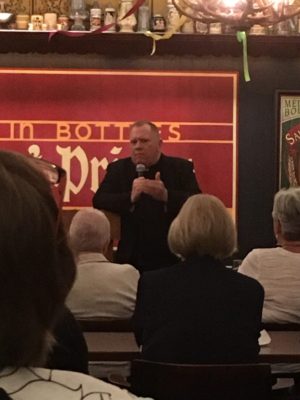June 7, 2018
UPDATED: St. Thomas More Society hosts presentation on opioid crisis
REGIONAL
Story and photo by Kathleen Harrington

Father Mark Stelzer addresses St. Thomas More Society members at the annual social on May 30 at The Fort restaurant in Springfield.
Editor’s note: This article has been corrected to reflect the number of years Father Stelzer has been on the Elms College faculty, the proper spelling of Jeffrey Trant’s last name, and the statement that most rehabilitation facilities do not have 90-day treatment programs.
SPRINGFIELD – Father Mark Stelzer spent Wednesday morning, May 30, presiding at a funeral Mass for a 31-year-old woman who died of a heroin overdose.
Speaking later that day to the St. Thomas More Society in Springfield he said, “The grief in the church was palpable.”
He explained that he is very dear friends of the grieving family and knew the deceased since childhood. He said though he has performed many funeral Masses in many different circumstances, “This is one of the few times I actually felt my voice quivering.”
Father Stelzer was the guest speaker at the St. Thomas More Society’s Annual Spring Social at The Fort Restaurant. Speaking to members of the legal community, Stelzer focused on the opioid crisis and the disease of addiction. “The reality is after treatment, many people relapse,” he said. “It’s a hallmark of the disease.”
On the faculty at Our Lady of the Elms College for the last 31 years, Father Stelzer has taught a course titled, “Addiction and Recovery: A Spiritual Journey,” for the last 16 years. In recovery himself from an addiction to alcohol, he serves on the board of directors of Guest House, a Michigan treatment center for Catholic clergy men and women religious suffering from addiction.
“It’s a family disease. It’s in the genes,” Father Stelzer told the crowd. There are no economic or social boundaries for the addiction to opioids. For the members of the legal profession, they encounter the fallout of addiction in criminal, civil, and family court.
“We see it in criminal cases, family breakups, divorce and custody cases, and civil disputes,” said Michael McDonough, an attorney with Egan, Flanagan, and Cohen and one of the organizers of the evening. “It turns otherwise good people into bad people making bad judgments and ripping families and lives apart.”
Sister of St. Joseph Mary Quinn said family members and loved ones are in recovery as much as the addict. On hand for the evening’s talk, she said her ministry includes working with women with addictions at the Women’s Regional Correctional Facility in Chicopee. Father Stelzer celebrates Mass at the jail. He said at any time, an estimated 92 percent of the population at the jail is dealing with addiction issues.
Providing the staggering numbers of the opioid epidemic, Jeffrey Trant told the group that there have been 250,000 opioid-related deaths in the United States since 1999. In 2017 alone, there were 63,000 deaths. A doctoral candidate at SUNY (State University of New York) Albany, Trant’s research focuses on opioids and mental health.
“The opioid epidemic is an addiction problem. It’s also a mental health issue,” he said. “People with a mental health disorder are predisposed to being prescribed opioids and they are more predisposed to getting addicted.”
Available treatment does not adequately meet the needs of those seeking recovery.
Father Stelzer said most rehabilitation facilities do not offer 90 days of treatment. “90 days is the amount of time needed to restore thought process. It’s just the beginning of the journey to recovery,” he said.


 Facebook
Facebook Youtube
Youtube
